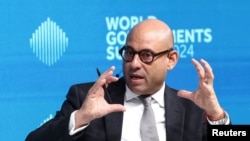Humanity has made strides tackling global warming but remains on track for a "ruinously high" rise in the Earth's temperature, the U.N.'s climate chief said as crucial negotiations began Monday.
Diplomats meet every June in Bonn to try and advance the stickiest points in climate negotiations so that political leaders can finalize agreements at the year-end COP summit.
At this year's Bonn talks, which run until June 13, the main issue is money — how much wealthy nations should pay to help low-income nations cope with climate change.
A new, longer-term goal for climate aid is supposed to be agreed by nearly 200 nations at the COP29 summit in Baku, the capital of Azerbaijan, in November.
Simon Stiell, the executive secretary of the United Nations Framework Convention on Climate Change, urged those attending the Bonn midyear talks "to make every hour here count."
"We cannot afford to reach Baku with too much work still to do," he told negotiators in the German city.
International diplomacy had avoided a scenario where the planet warmed by five degrees — a world in which "most of humanity likely couldn't survive," Stiell said.
"We are now headed for around 2.7 degrees. This is still ruinously high and there's a long and steep road ahead," he added.
Under the Paris agreement in 2015, nations agreed to limit global warming to "well below" two degrees Celsius above pre-industrial levels to avoid the worst impacts of climate change, and to strive for a safer 1.5 C cap.
Incoming COP29 president Mukhtar Babayev said progress made at Bonn "will be the foundation stones of tangible results at COP29."
In 2009, wealthy nations most responsible for climate change to date agreed to raise $100 billion a year by 2020 for countries without the means to invest in clean energy and adapt to extreme weather.
They only met this target for the first time in 2022, two years past the deadline set. Donors have also been criticized for extending loans instead of grants.
The next round of financial pledges looks beyond 2025 but there is no consensus on how much should be raised, who should pay it, and where it should go first.
There has been pushback to calls for prosperous emerging economies like China and Gulf nations to chip in.
Some countries want the level of their climate action contingent on how much money is made available. Countries are supposed to submit their updated climate plans by early 2025.














